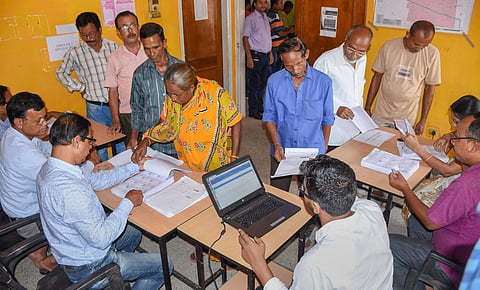Citizens’ group urges SC to reaffirm India’s obligations on immigrants
GUWAHATI: A group of eminent citizens is not happy over the statement made by a Supreme Court bench that advocated greater detention of illegal immigrants in Assam.
The citizens, under the banner of Commonwealth Human Rights Initiative, urged the apex court to reaffirm India’s constitutional and international obligations on the complex issues of nationality, detention and deportation and not be unmindful of its own duties.
“As concerned citizens, we look to the Supreme Court to reaffirm India’s constitutional and international obligations to rights on sensitive issues. That is why we are disappointed by recent statements by the Chief Justice of India on a complex matter relating to illegal detention and deportation, without heeding India’s own constitutional and international obligations,” they said in a statement.
They said while advocating greater detention of suspected foreigners, the CJI had brushed aside the Assam chief secretary with a stinging admonition for proposing a methodology for the release of a handful of foreign prisoners who had been in detention beyond their term of sentence for illegal entry. This, they said, was especially of concern for the case concerned the wilful violation of human rights of hundreds of detainees who were languishing in what the court itself accepts are inhuman conditions.
“Article 21 is very clear in its intent, ambit and process. It binds all duty-holders and citizens with the ringing affirmation that no person in India (and we emphasize that there are no special privileges here for Indian citizens) can be deprived of her/his right to life and liberty without due process…
“There is no deportation agreement with Bangladesh. International law lays down that such deportations can take place only with the consent of the country of origin. Bangladesh has consistently refused to accept that its citizens migrate in large numbers to India. Indeed, Bangladesh regards such unilateral efforts as harmful to a bilateral relationship that is critical for the security and stability of both countries and especially of our eastern region. We cannot place ourselves in a situation where we are seen as forcing people out at gunpoint; it would be ethically unjust, wrong in law and draw international condemnation,” the statement reads.
It was issued jointly by CHRI chairperson Wajahat Habibullah, who is India’s first Chief Information Commissioner, former SC judge Madan B Lokur, former Chief Justice of Delhi High Court AP Shah, former Under Secretary in the United Nations Nitin Desai and former Assam Director General of Police Jayanta N Choudhury.
They said they were acutely sensitive to concerns in Assam and elsewhere in the country about the problem of illegal migration from Bangladesh, which is a long-standing issue that defied official proclamations and pledges of “push back”, “deportation” and “detection”.
“Whatever methods are used, they must be undertaken within the rule of law, be just and fair and designed to minimise individual hardship and tragedy. We believe this is a tragedy of growing intensity which is gathering momentum as a result of the current National Register of Citizens (NRC) exercise in Assam. Accounts from Assam indicate that often arbitrariness, not rule of law, is used to define those who have come post-1971 from Bangladesh (of whatever religious denomination) and those who are Indian nationals,” the citizens said.
Lakhs are in limbo and now fear that they may become “stateless” because of a process that is mired in a mix of complexity, confusion, lack of precision and prejudice, they said, adding many of those at risk are from the bottom of the economic pyramid, unable to sustain the complex adjudication process needed to establish their citizenship.
“Although the Supreme Court mandated deadline for a final list is July 2019, we understand that not less than 38 lakh persons out of the 40 lakh who had found themselves off the NRC last year have filed applications for inclusion. Such a huge number of requests cannot be processed in two months and we urge that this not be hurried as the consequences are too devastating to contemplate. The efforts need to be steady and methodical so that the charges of arbitrariness, prejudice and poor record keeping, which have plagued the NRC process, do not stick,” they said.
They appealed to the judicial system and the government to explore a solution that addresses the human dimension. The situation in Assam and other parts of the northeast poses unprecedented challenges and conditions that cannot be resolved by application of a routine legal framework which is designed to deal with individual cases, they added.

